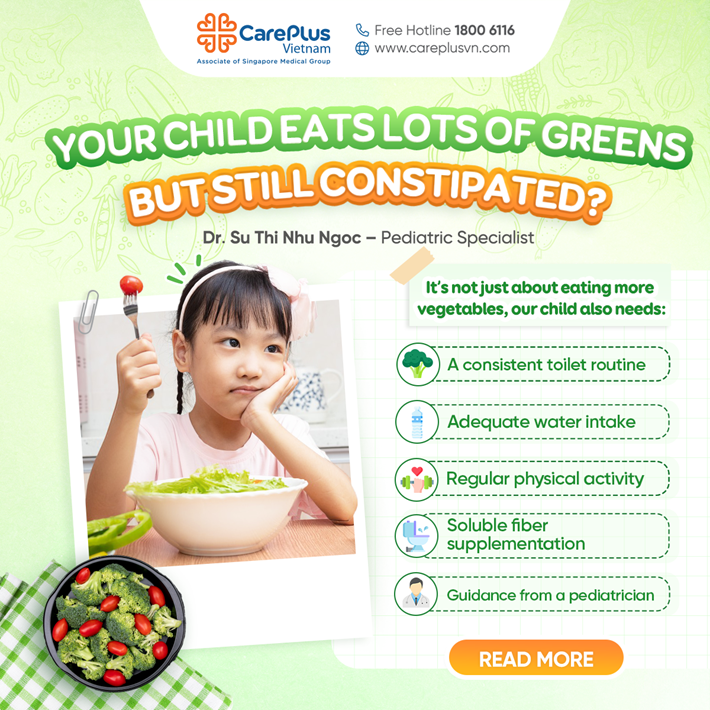VEGGIES ARE GOOD, BUT THEY CAN’T FIGHT CONSTIPATION ON THEIR OWN!

7/18/2025 3:49:47 PM
VEGGIES ARE GOOD, BUT THEY CAN’T FIGHT CONSTIPATION ON THEIR OWN!
"I’ve been giving my child plenty of vegetables, but they’re still constipated. I just don’t get it!" This is something we hear often from parents visiting the Pediatric Gastroenterology Department at CarePlus.
Constipation isn’t just about eating too little fiber or not enough vegetables. To really help your child, we need to understand what’s going on — not just keep saying “Eat more greens.”
Let’s explore with Dr. Su Thi Nhu Ngoc the right way to support your child’s digestion!
1. Fiber – Why It’s Important for Digestion
Fiber is the part of plant foods that the body can’t digest. It helps keep the digestive system moving smoothly.
-
Soluble fiber: dissolves in water and forms a gel-like texture in the gut. It softens stools and makes it easier to pass. Found in: oats, prunes, apples, pears, carrots, ripe bananas, pumpkin, avocado…
-
Insoluble fiber: doesn’t dissolve in water. It adds bulk to stool and helps push things through the gut. Found in wheat bran, leafy greens (like spinach, amaranth), fruit skins, whole grain bread, sweet potatoes...
A healthy diet should have both types of fiber. Usually, the ideal ratio is 2 parts insoluble to 1-part soluble fiber. But when a child is constipated, we often recommend more soluble fiber (about 1:1) to help soften stools and support healthy gut bacteria.
2. How Much Fiber Does Your Child Need?
According to the Institute of Medicine, kids need:
-
Ages 1–3: 19g/day
-
Ages 4–8: 25g/day
-
Ages 9–13: 26g/day (girls), 31g/day (boys)
-
Ages 14–18: 29g/day (girls), 38g/day (boys)
Many children only get 40–60% of the recommended amount — even if they’re “eating lots of veggies” in the eyes of adults.
3. Not All Veggies Are Equal When It Comes to Fiber
-
Some vegetables have low fiber content, especially the soluble kind.
-
A diet with only insoluble fiber (like certain greens) adds bulk but doesn’t hold water. Without enough fluids, this can make stools drier and harder.
-
Eating “lots of vegetables” but not enough fruits, beans, or whole grains can lead to unbalanced fiber intake — or not enough soluble fiber.
4. Other Things That Affect Constipation (Not Just Fiber!)
-
Too little water: Fiber needs water to work well. Without enough fluids, especially insoluble fiber can make constipation worse.
-
Not enough movement: Physical activity helps keep the bowels active. Sitting too much slows everything down.
-
Toilet habits: Holding in bowel movements, or not having a set toilet routine, can lead to problems.
-
Stress or fear: Being afraid of pain, school toilets, or public restrooms can make kids avoid going — which only makes things worse.
-
Medical reasons (less common): Milk protein allergy, pelvic floor issues, or conditions like Hirschsprung’s disease.
5. So, What Can Parents Do?
It’s not just about giving more vegetables. Try to:
-
Add soluble fiber from fruits, oats, and legumes
-
Encourage your child to drink more water, especially when eating high-fiber foods
-
Keep them active every day
-
Build a regular toilet routine — no pressure, just gentle encouragement
-
Talk to a doctor if your child has long-term constipation, poop accidents, or avoids going to the toilet
👩⚕️ Advice from Dr. Su Thi Nhu Ngoc:
“Fiber is important, but it’s not the only thing that matters. The right mix of fiber, enough water, daily movement, and a relaxed mindset — that’s what really helps children stay regular and healthy”.